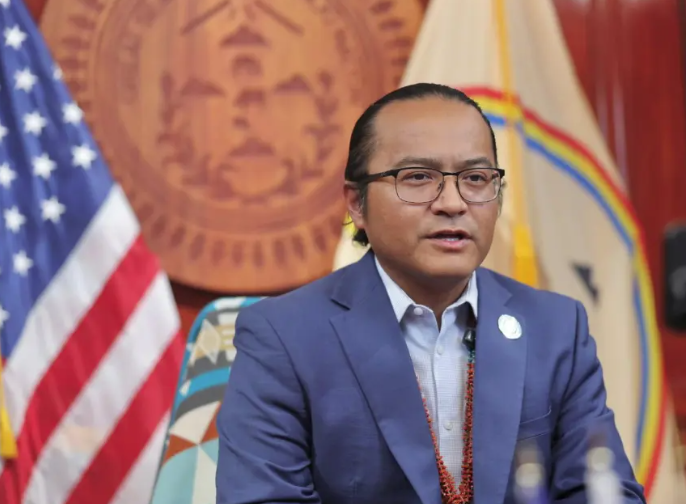
- Details
- By Levi Rickert
Navajo Nation President Buu Nygren on Saturday accused Navajo Nation Council Speaker Crystalyne Curley of attempting to seize the presidency through a series of legal and legislative actions, including a newly filed removal bill and an ethics complaint lodged by the tribe’s special prosecutor. On Friday, Curley introduced legislation seeking the removal of Nygren and Vice President Richelle Montoya, citing alleged malfeasance, misfeasance, and breaches of fiduciary duty.
In a statement addressed to “My Navajo People,” Nygren said Curley’s actions — along with an ongoing lawsuit she filed against him — are part of “a deliberate effort by the Speaker to take for herself the Navajo Presidency.”
Nygren pushed back on Curley’s legislation, which centers on allegations of overreach and violations of separation-of-powers provisions. He said online speculation about the case has been fueled by “misinformation.”
“I have been attending the trial, and the court has only made two rulings so far. The trial is nowhere near over,” Nygren said. “The court has not ruled that the Speaker’s allegations are correct. In short, as has been the case before, the Navajo Times’ reporting on this case has been incorrect.”
Nygren offered no details about the special prosecutor’s complaint or Curley’s removal bill but characterized both as deeply flawed.
“They appear to be flawed in multiple ways, which I will address at a later date,” he said.
The president criticized Curley for what he described as aligning herself with political opponents who previously sought to recall him. That recall effort failed earlier this year.
“It is disgraceful that Speaker Curley has aligned herself with those who spearheaded the failed recall effort against me,” Nygren said. “She is simply wanting to take for herself the Navajo Presidency.”
Despite the political turmoil, Nygren said he intends to stay focused on his administration’s priorities.
“Despite these political attacks, I remain focused on serving the Navajo people and continuing the work to bring homes, water, and essential services to our communities,” he said.
More Stories Like This
Native News Weekly (August 25, 2024): D.C. BriefsMonday Morning (March 2, 2026): Articles You May Have Missed This Past Weekend
Native News Weekly (March 1, 2026): D.C. Briefs
Scope Narrowed, Report Withheld: Questions Mount Over Michigan Boarding School Study
Zuni Youth Enrichment Project Announces Family Engagement Night and Spring Break Youth Programming
Help us defend tribal sovereignty.
At Native News Online, our mission is rooted in telling the stories that strengthen sovereignty and uplift Indigenous voices — not just at year’s end, but every single day.
Because of your generosity last year, we were able to keep our reporters on the ground in tribal communities, at national gatherings and in the halls of Congress — covering the issues that matter most to Indian Country: sovereignty, culture, education, health and economic opportunity.
That support sustained us through a tough year in 2025. Now, as we look to the year ahead, we need your help right now to ensure warrior journalism remains strong — reporting that defends tribal sovereignty, amplifies Native truth, and holds power accountable.
 The stakes couldn't be higher. Your support keeps Native voices heard, Native stories told and Native sovereignty defended.
The stakes couldn't be higher. Your support keeps Native voices heard, Native stories told and Native sovereignty defended.
Stand with Warrior Journalism today.
Levi Rickert (Potawatomi), Editor & Publisher

